 MyDogBreeds
MyDogBreeds South Russian Ovcharka is originated from Russia but German Spitz (Mittel) is originated from Germany. South Russian Ovcharka may grow 28 cm / 12 inches higher than German Spitz (Mittel). South Russian Ovcharka may weigh 41 kg / 91 pounds more than German Spitz (Mittel). South Russian Ovcharka may live 4 years less than German Spitz (Mittel). Both South Russian Ovcharka and German Spitz (Mittel) has same litter size. Both South Russian Ovcharka and German Spitz (Mittel) requires Moderate maintenance.
South Russian Ovcharka is originated from Russia but German Spitz (Mittel) is originated from Germany. South Russian Ovcharka may grow 28 cm / 12 inches higher than German Spitz (Mittel). South Russian Ovcharka may weigh 41 kg / 91 pounds more than German Spitz (Mittel). South Russian Ovcharka may live 4 years less than German Spitz (Mittel). Both South Russian Ovcharka and German Spitz (Mittel) has same litter size. Both South Russian Ovcharka and German Spitz (Mittel) requires Moderate maintenance.
 Known also as the South Russian Sheepdog or the Ukranian Shepherd Dog, the South Russian Ovcharka’s history isn’t well established, and there are different stories to its history.
Known also as the South Russian Sheepdog or the Ukranian Shepherd Dog, the South Russian Ovcharka’s history isn’t well established, and there are different stories to its history.
Whatever their history, this large dog is closely related to the wolf and has also been crossed with sight hound dogs. Their numbers have been under threat when their role as herding dog was no longer needed for rural life.
It was in the 1920s however that the breed’s numbers were restored and the UKC officially recognised the South Russian Ovcharka in 1996.
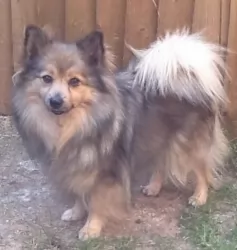 Originating in Germany, the German Spitz Mittel is an alert, vigilant dog and it is these qualities that made him sought after for working on farms.
Originating in Germany, the German Spitz Mittel is an alert, vigilant dog and it is these qualities that made him sought after for working on farms.
He is no new breed and is the 3rd largest of the five German Spitz varieties. It is believed that the German Spitz descended from the Northern sled and herding dogs which arrived with the Vikings into Europe. When you do research you see that the dogs are mentioned in German literature which dates way back to to 1450 already.
 A large, big boned, well muscled herding dog, the South Russian Ovcharka stands at between 62 and 66cm in height and weighs between 46 and 52kg.
A large, big boned, well muscled herding dog, the South Russian Ovcharka stands at between 62 and 66cm in height and weighs between 46 and 52kg.
The dog has a thick, fairly coarse, weather-proof coat that can become long and this coat has always protected them from the harsh Russian winters.
He has small, floppy ears and the tail is medium length and also covered in thick fur.
These dogs need a lot of exercise and if you keep one as a pet he will need a lot of space to run and play. He guards his property too and makes a good watchdog.
He isn’t suited to living in small spaces in the city. He is a dominant, independent and strong willed dog so training and socialization will be important if you don’t want him to be unruly.
With the right kind of training, the South Russian Ovcharka can get along with pets and children in the home. He isn’t aggressive but he has strong guardian characteristics.
The first time dog owner would need to be firm, strong, confident, consistent and kind to handle this strong willed dog.
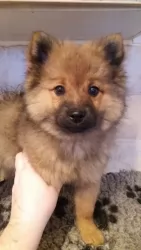 The German Spitz Mittel is similar in looks to the other sizes of German Spitz. The Mittel is a medium sized dog and stands between 30 and 38cm in height and weighs between 7 and 11kg. You’ll find him in solid colors such as tan, liver, white, fawn, black or a mix of these colors.
The German Spitz Mittel is similar in looks to the other sizes of German Spitz. The Mittel is a medium sized dog and stands between 30 and 38cm in height and weighs between 7 and 11kg. You’ll find him in solid colors such as tan, liver, white, fawn, black or a mix of these colors.
He has a soft woolly undercoat and a long outercoat with a mane-like ruff at the neck. He has a fairly long muzzle, dark eyes, sharp erect ears and a bushy tail which curls over his back.
Affectionate, faithful, and always happy by nature, the German Spitz Mittel is a family companion that wants to be part of everything his human family is up to. He makes a good watchdog. He is alert and has a distrust of strangers.
He gets on well with children in the home and he can also live in peace with other dogs. Because he is an intelligent dog, you won’t have much trouble with training- and socializing him, although he will require a firm, consistent owner and trainer.
Training and socialization are important as there are always some important commands such as sit, stay, come and lie down that you will want him to respond to immediately.
 The South Russian Ovcharka may well be independent and strong headed but there is nothing that a little bit of training and socialization can’t do.
The South Russian Ovcharka may well be independent and strong headed but there is nothing that a little bit of training and socialization can’t do.
He is intelligent and will pick up some obedience commands easily. He is is dog that will like a strong, firm, consistent owner - someone who likes to include him in all the family activities.
He can get on with children but is better suited to life on a larger property as opposed to living in a small city place. Treat him with firmness and fairness and you’ll get yourself an excellent pet and companion.
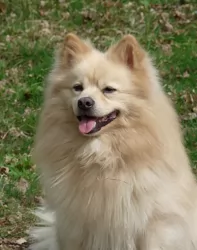 People who have owned a German Spitz Mittel are delighted with him, saying that he is such an easy-going, happy dog. He is social and thrives on the interaction he has with his human family.
People who have owned a German Spitz Mittel are delighted with him, saying that he is such an easy-going, happy dog. He is social and thrives on the interaction he has with his human family.
He won’t do well if you simply put him in your backyard and forget about him, using him merely as a watchdog.
The German Spitz Mittel dog is one dog that definitely lives up to the title of man’s best friend. He is social, happy, loving, loyal, playful, entertaining and smart too, and when you treat him the way he deserves, you’ve got the most awesome friend.
 This large breed has a lifespan of 9 to 11 years. Some of the health conditions to which this big dog can succumb are -
This large breed has a lifespan of 9 to 11 years. Some of the health conditions to which this big dog can succumb are -
This is something that affects many dogs, but particularly large dogs. When the hips haven’t formed properly, it can lead to pain, disability and arthritis.Lifestyle changes can help, like making sure your dog doesn’t pick up too much weight. For pain management you will need to get your pet to the vet.
Also known as Gastric Dilatation. The dog’s stomach fills with gas and can twist, and this in itself can be fatal. As soon as you see your pet pacing restlessly and he has a swollen stomach, he will need to get to the vet just as soon as possible.
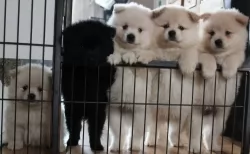 German Spitz dogs are healthy, and when you shower him with love and attention and good food, you can expect to have him around for up to 15 years of age.
German Spitz dogs are healthy, and when you shower him with love and attention and good food, you can expect to have him around for up to 15 years of age.
Of course, as with any other healthy dog breeds, there are always one or two common dog illnesses that your dog may get. These include hip dysplasia and eye diseases. If you notice symptoms that indicate possible joint issues with your pet, get him to the vet immediately.
Patellar Luxation for instance occurs when your dog’s kneecap is dislocated. It is more common in toy breeds like the German Spitz. It can be painful for your pet and lead to lameness. If your dog has problems with his hip, it can actually force the patella out of its groove, which is a secondary condition.
 The long coat is certainly going to need a good brush at least twice a week as it can so easily become matted.
The long coat is certainly going to need a good brush at least twice a week as it can so easily become matted.
Because he has floppy ears, you will need to check inside the ears that they aren’t showing signs of redness, indicating the possibility of a ear infection. Check at the same time for ticks and fleas.
This dog is going to need a good deal of exercise to keep him content. He will love a long walk out and about. Robust games will also need to be provided. It’s why he isn’t looked upon as a dog suited to the city. He needs a lot of space and can become frustrated and destructive if his exercise needs aren’t met.
A dog is part of the family and he therefore deserves a good meal too. Good food is beneficial as it means your dog is less likely to get sick.
Like many dog owners, you’ll no doubt appreciate the convenience of commercially manufactured dog foods. You’ll need to choose the best one though because the inferior ones are made up of bad ingredients – fillers that have no goodness whatsoever.
To provide your South Russian Ovcharka with a tasty treat, try and give him some home-made food. Boiled chicken, rice or pasta, sweet potatoes, carrots and spinach are simple and tasty and won’t trouble your dog’s stomach.
Chop some of it up and add a small portion of this into his dry kibble twice a week. Your dog’s wagging tail will tell you how much he loves it.
To avoid skin infections, try to include some raw meat into his diet too when you can. Make sure your dog has a constant supply of fresh, cool water.
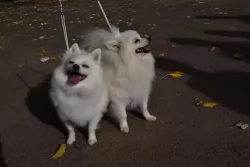 You can help reduce loose hairs with your German Spitz by brushing his thick coat twice a week. It’s a good time to also inspect your dog for ticks and fleas.
You can help reduce loose hairs with your German Spitz by brushing his thick coat twice a week. It’s a good time to also inspect your dog for ticks and fleas.
Your German Spitz Mittel isn’t the most active dog, but he will still need regular exercise. Going on a walk is good for both you and him. He is a mentally sharp dog too and these walks keep him both physically- and mentally fit. He also loves ball games.
Every dog deserves the best food, and if you feed your German Spitz Mittel with a commercially manufactured dog food, make sure its one of the top quality ones. You want to avoid foods packed with preservatives, colorants and fillers. You want dog foods with minerals and vitamins with high protein and ingredients such as Omega 3 and 6 to promote health skin.
There are also some dog foods which have ingredients in them such as polyphosphates. Ingredients like this keep your dog’s teeth clean.
Try and also give him some cooked rice, vegetables and chicken mixed into his kibble from time to time as well as raw meat. He should never be without fresh, cool water.